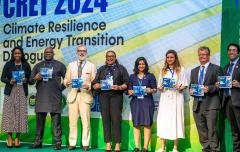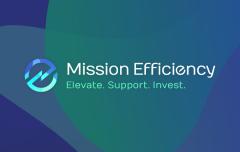African First Ladies and Women Energy Leaders Commit to a Clean Energy Transition
Nairobi, 7 September - On the sidelines of the inaugural Africa Climate Summit taking place in Nairobi, Her Excellency Rachel Ruto, the First Lady of the Republic of Kenya, together with other African First Ladies from across Africa as well as civil society, the private sector, academia, and non-government organizations recommitted to enhancing the role of women in the energy transition across Africa.
The First Ladies and women energy leaders highlighted the importance of transitioning to renewable and clean energy sources and the integral role women must play in this transition, including closing electricity access gaps and promoting clean cooking solutions, especially in rural and low-income areas.
The energy transition has strong interlinkages with other sectors like health, climate change, and gender, and the First Ladies encouraged greater investment, strengthened partnerships and collaboration among governments, civil society, the private sector, and international organizations to promote the changes that will lead to a more sustainable future.
Women have a deep understanding of local contexts and traditional knowledge, facilitating the adoption of sustainable energy practices within communities, and the First Ladies and women leaders reiterated that women should not be seen as mere beneficiaries of energy projects but should be included as key stakeholders in the energy transition and their voices must be heard.
"It is undeniable that women play a pivotal role in steering the energy transition towards a sustainable future across Africa. Their engagement transcends environmental preservation; it is a catalyst for fostering social and economic equity.
While designing policy interventions and solutions that will accelerate the energy transition, women need to be involved to ensure that interventions are built with the users in mind."
Her Excellency Rachel Ruto, First Lady of the Republic of Kenya
“The energy transition in Africa presents an unparalleled opportunity to address climate change, promote sustainable development, and achieve gender equality. Empowering women and recognizing their pivotal role in the energy sector will yield transformative outcomes, including improved energy access, reduced emissions, and enhanced resilience.”
Damilola Ogunbiyi, CEO and Special Representative of the UN Secretary-General for Sustainable Energy for All
“The underrepresentation of Women at decision making levels of the energy and extractives sector is closely linked to their low representation in STEM higher education, preventing them from competing for better-paying and more influential positions in the sector. Partnerships with utilities and universities is creating the enabling environment to increase female representation in STEM and address this imbalance over time.”
Dr. Victoria Kwakwa, World Bank, Regional Vice President (East and Southern Africa Region)
"The resilience and perseverance of women on the front lines of the climate and energy crisis must be matched with political prioritization and financial mobilization at the highest levels,” said Dymphna van der Lans, CEO of the Clean Cooking Alliance. "Africa's First Ladies and women leaders possess a unique ability to facilitate dialogue and partnerships to advance clean cooking and a just energy transition that unlocks climate action, gender equity, health and sustainable development."
Dymphna Van der Lans, CEO, Clean Cooking Alliance
“To allow women to be truly empowered and play a transformational role in the African energy transition, we must address existing gaps. First of all, with women and girls in SSA ranking highest in lack of energy access, we have to close the energy gap. Second, women (energy) entrepreneurs need technical support, mentoring and access to finance. Third, company and institution policies and practice need to become gender-inclusive. Fourth, we need to invest more in women and girls in STEM education and in digital literacy. And last but not least, we need African women leaders to step up and become sources of inspiration for other women and girls.”
Sheila Oparaocha, Executive Director ENERGIA Network
Notes to Editors



